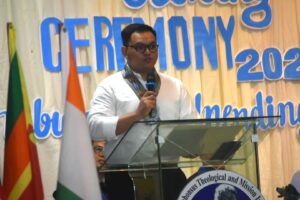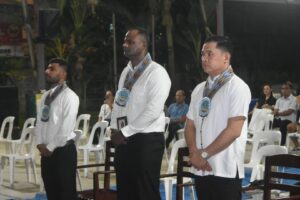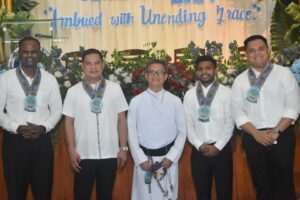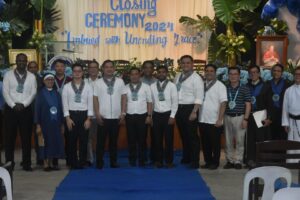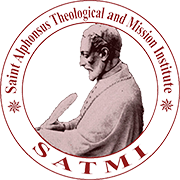𝐋𝐄𝐓 𝐔𝐒 𝐊𝐄𝐄𝐏 𝐃𝐎𝐈𝐍𝐆 𝐓𝐇𝐄𝐎𝐋𝐎𝐆𝐘
𝒃𝒚 𝑹𝒆𝒚 𝑱𝒖𝒍𝒐 𝑶. 𝑩𝒊𝒍𝒊𝒓𝒂𝒏, 𝑪𝑺𝒔𝑹
Our esteemed members of the board, headed by Fr. Edilberto Cepe of the Redemptorists. Fr. Neil Badillo, our beloved SATMI Director, Sr. Miriam Alejandrino, OSB, our Dean of Studies, faculty and staff, fellow students and graduates, family and friends, good afternoon.
In college, I learned a song that never came out of my mind since then. The lyrics of the song asks, “Unsa ang papel sa Teolohiya sa kinabuhi tang puno sa luha? Unsay kahulugan sa maayong balita diha sa nasud nga nakigbisog?” What is the role of theology in our life full of tears? What is the meaning of the Gospel in our country that struggles?”
A valid question, indeed, to ask ourselves as we finish our five-year theological formation. So, what then? One might ask after the rigors of theological reflection, discourses, and writing. One time, I was told rhetorically, or should I say sarcastically, “What will these theologies do to the poor?” Yes. Another valid question to ask reflexively. No question. However, with the remark’s tone, it might be taken somehow that the remark seems to dichotomize theology and pastoral action, as if theology has nothing to do with what we do in our pastoral ministries and missions. It appears to opine that theology is up there and has nothing to do with our pastoral responses down here.
As we were taught, theology plays an essential role in the life of the Church. As a “scientific reflection on the divine revelation which the Church accepts by faith as universal and saving truths” (cf. ITC, Theology Today: Perspectives, Principles, and Criteria, 2011), theology seeks meaning and action to what God has revealed and continues to reveal. This tells us how our theologies are both shaped by divine revelation mediated in human experience and how our theologies shape human action personally and collectively. Our theologies and theologizing produce our personal and ecclesial structures, our pastoral responses. This is what I pondered when thinking about the question that the song begs and the seemingly sarcastic remark. Our beliefs and understanding will always be translated into our actions, consciously and unconsciously. For example, Our understanding of God colors how we see ourselves and relate with others. Our understanding of a male image of God, the female image of God, or a God beyond gender categories; Our understanding of God, whether He/She is vindictive or ever-loving, just or merciful, or both, shapes the way we make structures and how we deal with people. Our understanding of the Church, whether it is primarily as a people of God or as something definitively and pyramidically arranged according to the sacral orders, defines the structures of engagement, governance, and decision-making, hence communion, participation, and mission in the Church. Our understanding of priesthood and religious life, whether it is from a “deformed theology of separation” as Pope Francis has denounced, or an emphasis on the cultic or liturgical function of the presbyter or priesthood that shares in the liberating and salvific mission of Christ, colors the way we do ministry.
At the same time, our personal and ecclesial experiences shape our theological reflection. It adds color to, in the words of Anselm, our fides quaerens intellectum or, as Fr. Antonio Pernia would say, a theological reflection that underlines a “fides quaerens linguam” – our continual search for understanding in theology or continual search for inculturating theology in the experience of people. Our experience in the apostolate and immersion areas put a concrete picture of this, which SATMI has wonderfully facilitated all these years – a theology and theologizing that listens, dialogues, and, if you may, synodal.
With this, on behalf of my batchmates, Antony, Jaymar, Alvin, Pelix, Dario, and Bretton – the SATMI graduating class of 2024 – are truly grateful to the institute that molded not only our academic-intellectual formation but has provided us opportunities to grow as an integral human person baptized in the name of the Trinitarian God – physically and humanly in touch to his person, spiritually enriched by faith and charism, academically competent, communally empowered and taken care of, and pastorally and missionary oriented.
To Fr. Neil Badillo of the Order of Friars Minor, the current director of SATMI, and those who were before him, Fr. Ino, the late Fr. Caloy, and Fr. Bert of the Redemptorists, Sr. Miriam Alejandrino, OSB (Redemptorist), our beloved dean, to the distinguished faculty, the ever-generous and available staff of SATMI from the front door to the library, we thank you for your generosity in teaching us to do theology and dialogue with life. We thank you for your generous collaboration in building up an institute that embodies a theology responding to the call of Vatican II to dialogue with the world. SATMI, with its strengths, challenges, and areas for growth just like any other institution, remains a concrete, wonderful gift not only to the Church of Mindanao and the Philippines but to Asia and the world. It continues to be a viable schola theologiae of and with great potential, having situated in a strategic locus theologicus, the island of Mindanao, where a glimpse of how a truly catholic, that is, universal and dialogical theology can be done.
To our formators, from Fr. Senen Javier to Frs. Sonny and Francis, and all in-between, Fr. Neil Badillo and Fr. Roy Vincent Husain of Mary’s Little Children Community, we thank you for your generous and patient accompaniment. To our shepherds, in whose care we are entrusted, the opportunities you have given us on behalf of the congregation and in the name of the Church for the sake of the mission are very much appreciated, and we thank you for that.
To our fellow students who have been with us through ups and downs, your presence, support, and light moments of laughter bring energy and break to those hectic days trafficked with papers and outputs that must be submitted. To you, we wish, “May your tribes increase!”
Thank you very much to our family and friends, whose presence always abides. Your prayers and support have always been essential. In this journey we take to you, we owe a lot.
To my fellow graduates, Dario, Jaymar, Antony, Pelix, Alvin, and Bretton, friends, as we walk past SATMI’s corridors that remind us of her lessons, we give our salute and cheer for all that has been. We hope and pray that its great potential grows, flourishing, and ever-serving in the Kingdom, and we all ought to participate in building it.
As we commence a new beginning, entering into a new threshold experience that is imbued with unending grace, let us not stop doing theology. Let that question of “Unsay papel sa teolohiya?” (What is the role of theology?) Continue to ring the bells of interest and passion for the sake of the Kingdom. Beyond the corners of our classroom, beyond the digital platforms of Zoom and Google, let us keep doing theology. Later on, God willing, we will be taking up our ministries. We will be doing various work. We will be passionately engrossed in where the Spirit calls us to work. But let us not stop doing theology, taking up the process of allowing our theologies and doing of theology, which SATMI has taught, to take shape in our ministries and our ministries and encounters to shape our theologies and doing as well. Friends, let us not stop finding God in those experiences and be found by God as well. Again, thank you very much! indeed, as Christ said in fulfillment of what was written, “Tetelestai.” It is finished, or should we say it is finishing.
Thank you. Peace and blessings to all.
